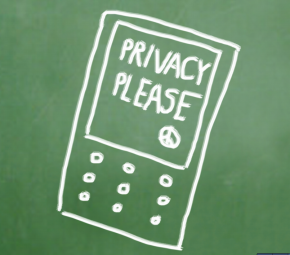Most school districts are failing to provide students, teachers and staff with clear policies that balance students’ legal right to privacy with the need for safety and order, warns a new ACLU of California report,
“H-E-L-L-O: Students have a right to privacy in their cell phones.” As cell phones become more and more indispensable to young people, confiscation and searches of students’ phones by school authorities has become widespread. Because such searches provide a window into every aspect of a students’ private life, they violate the laws that protect students’ privacy rights.
“Without reasonable suspicion that a student has violated a rule or law using the phone, beyond simply having it out in the open or turned on in violation of school policy, there is no legal justification for searching the phone,” said Hector Villagra, Executive Director of the ACLU of Southern California.
The report, sent to school superintendants statewide, summarizes the results of the ACLU’s examination of search and seizure policies in nearly 200 California school districts, reviews the current legal limits for searching students’ belongings, and lays out the components of an ideal model policy.
Privacy Concerns
Cell phones not only keep records of call logs, text messages and voicemails, but also store videos, photo albums, e-mail, records of webpages visited, and provide access to social networking sites and personal calendars. Indiscriminate searches of students’ cell phones therefore threaten students’ privacy rights in ways that have never before been possible.

The authors of “H-E-L-L-O” outline many privacy concerns, including these:
- Searching a cell phone can reveal not only virtually everyone a person knows and with whom he/she communicates and how often, it can also unveil a student’s political views, financial and personal struggles, family and romantic relationship dynamics and medical information such as doctor, therapist and counselor appointments.
- An administrator reviewing a student’s cell phone may uncover information regarding the student’s sexual orientation that the student has chosen to keep private from classmates, school staff, or perhaps even his/her parents.
- When students’ cell phones are paid for and owned by their parents or shared with them and/or siblings, an unrestrained search threatens not only the private information of that particular student, but that of the entire family.
“Sweeping searches threaten to teach our youth that such invasions of privacy are unavoidable, or worse, routine parts of civic life,” said ACLU attorney Linda Lye. “As technology advances, privacy protections must keep pace.”
The U.S. Supreme Court has long held that students have legitimate privacy expectations in public schools, and that any search of student property must be “reasonably related [in scope] to the objectives of the search and not excessively instrusive in light of the age and sex of the student and the nature of the infraction.” A search is justified only when an administrator has “reasonable grounds for suspecting that the search will turn up evidence that the student has violated or is violating the law or school rules.”
Curiosity, rumor or hunch, or even simply being disruptive, is not enough to warrant a search. A school may not search one student’s cell phone to discover evidence of another student’s potential misconduct.
“Simply put, to avoid potential constitutional violations, school districts should refrain from searching students’ cell phones,” concluded David Blair-Loy, Legal Director of the ACLU of San Diego and Imperial Counties.
The report acknowledges that cheating, cyberbullying, and sexting present pressing problems, but argues that “their solution cannot justify wholesale invasions of privacy, particularly in the more common instances when no such misuse of the phone is suspected.” In the past, the ACLU has opposed such invasions of student privacy as electronic monitoring and tagging of jerseys and backpacks, the collection of student information in electronic databases to be shared with the federal government and military recruiters, random drug testing, and unreasonable surveillance.
